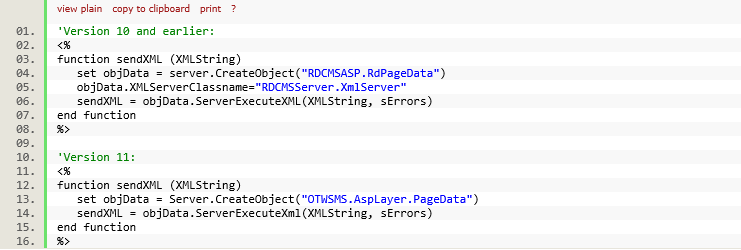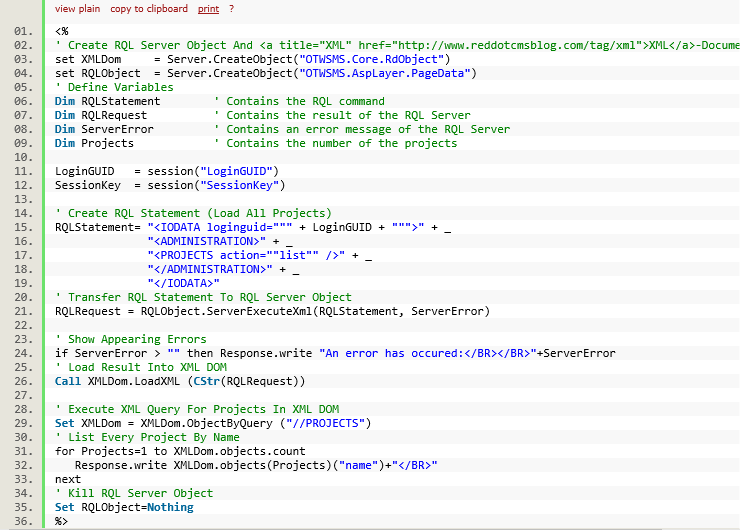
- Thomas Pollinger
- 09.01.2017
- EN
rdb: RQL development with OpenText Web Site Management Server 11
This is a cross post, courtesy of Manuel Schnitnger.
Today I’d just like to write a few lines about the changes regarding the RQL programming in version 11 of the OpenText Web Site Management Server (scheduled for the end of 2011). The change I’ll describe might sound like a totally different approach (and that is possible when looking behind the scenes) but the impact for you as someone who creates RQL based plugins is very small.
Ok, the change: In the Managment Server Version 11 (Swan version) Microsofts COM components for the RQL communication are not longer available/supported. Instead of the COM communication the OpenText Web Site Management Server will use the Windows Communication Foundation that is part of the .Net framework.
The reasons for the change
- COM components were introduced by Microsoft in the year 1993 (18! years ago) and worked well for the OpenText Web Site Management Server. But nowadays it seemed to be much better to rely on a state-of-the-art technology.
- Microsofts support for COM components ended years ago and we would like to use a fully supported technology.
What does that mean for your RQL based plugins?
- If you use the RQL webservices for the communication within your plugins, then the change does not have any impact.
- If you use the COM objects, then you’ll have to implement small changes.
In order to provide a good overview I’ll provide a function that is probably used by many developers and in a second step I’ll provide a sample RQL plugin that is intended to run on a OpenText Web Site Management Server version 11.
New functions will do the following things
- receive a string (RQL command)
- create an object (RQL object)
- execute the RQL command
- and return a XML structure (server response)
The changes to this function are obviously very small:
- Instead of RDCMSASP.RdPageData we now use OTWSMS.AspLayer.PageData to create the RQL object.
- the line” objData.XMLServerClassname=”RDCMSServer.XmlServer” is not longer used in this function.
How do I update my old plugins to work on version 11?
- Use the Search&Replace function of your development environment: Search for “RDCMSASP.RdPageData” and replace it with “OTWSMS.AspLayer.PageData“
- “Use the Search&Replace function of your development environment: Search for “objData.XMLServerClassname=”RDCMSServer.XmlServer” and replace it with “”.
Hint 1: If your obejcts do have other names….then of course you have to use different search strings ;)
As most people (including me) like to have a runing script instead of just a code snippet, this sample plugin might be helpful:
Hint 2: If you have a closer look at the script, you’ll notice that there is another change that I forgot to mention.
If you don’t use the Microsoft XML-DOM object but the one that is provided by the OpenText Web Site Management Server you’ll also have to change this line:
The same line in version looks like this:
So another search & replace task would look like this:
Search for “RDCMSAspObj.RdObject” and replace it with “OTWSMS.Core.RdObject”
Ok, so these were the changes regarding RQL communication. A description of the changes as well as the sample RQL plugin (above) are planned to be part of an updated RQL documentation.
To answer a question that might possibly occour: No, I’m not aware of any other changes regarding RQL. ;)
Have fun with RQL !
Über den Autor:
... ist Senior Site Reliability Engineer bei der Vodafone GmbH in Düsseldorf. Seit dem Jahr 2007 betreut er zusammen mit seinen Kollegen die OpenText- (vormals RedDot-) Plattform Web Site Management für die deutsche Konzernzentrale.
Er entwickelt Erweiterungen in Form von Plug-Ins und PowerShell Skripten. Seit den Anfängen in 2001 (RedDot CMS 4.0) kennt er sich speziell mit der Arbeitweise und den Funktionen des Management Server aus.



